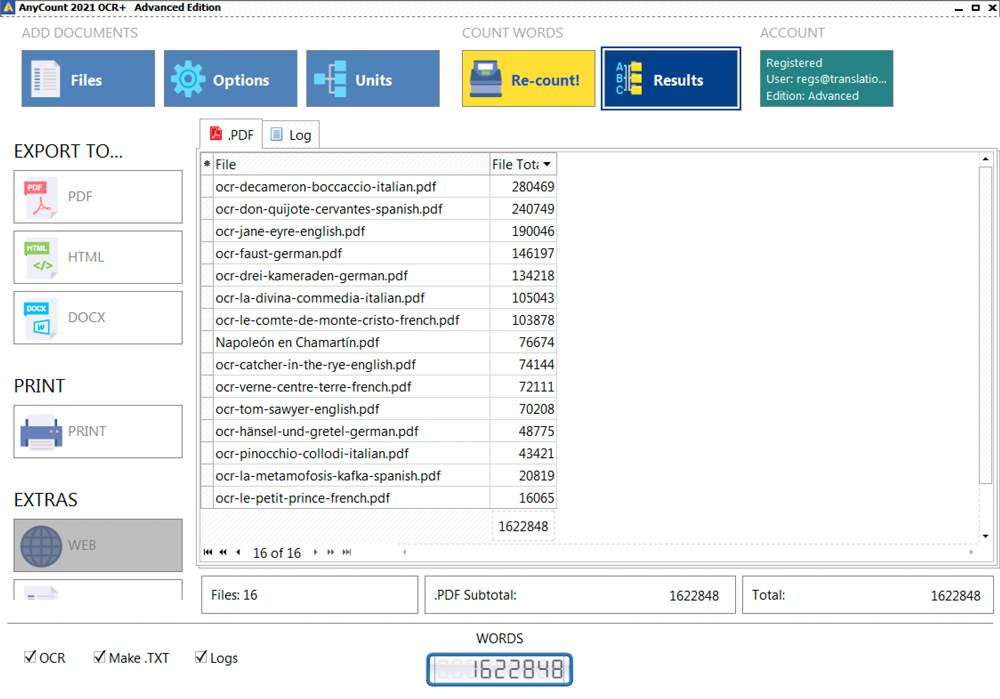15 Oct

It’s not always obvious what units you should use when translating from different languages. Are text count units the same in different countries? Each language has its peculiarities, and count units may differ from country to country.
| Сountry | Count Units |
|---|---|
| Poland | Source word or 1000 source words |
| United Kingdom | Source word or 1000 source words |
| USA | Word of the source text |
| Germany | Per 1000 words of the source text |
| France | Word of the target text |
| Belgium | Line of 60 characters with spaces |
| Bulgaria | Line of 60 characters or page of 1800 characters |
| Chile | Page of 250 words |
| Croatia | 1800 characters with spaces |
| Latvia | Page of 1800 characters |
| Japanese | Source character count |
| Chinese | Source character count |
| Hebrew | Source word count |
| Modern Korean | Word count |
Chinese
For Chinese, it’s usually a price per character. Many words include multiple characters in Chinese, but automatic word count in Chinese text is impossible because the same character is used in many combinations, creating different words. A Chinese text can combine a significant volume of information using very few words, and therefore the translation of this text becomes bigger.
Usually, a 1000 word English text translated into Chinese might be around 1300-1700 characters long, and vice-versa. Sometimes translator uses a multiplier of 1.5, i.e., 1500 Chinese characters, usually translates into about 1000 English words.
Japanese
Japanese is usually charged per source character. The main reason is that it’s impossible to understand without reading the text where one word ends and another begins outside of particles. The standard method for estimating how many English words will come out of the translation of Japanese text is to divide the total number of Japanese characters by 2.5. You can use this formula to make a rough calculation.
Korean
Modern Korean uses spaces between words. Now Korean is usually written in rows from left to the right, top to bottom, and this makes it possible to count words on a spacing basis and apply a more familiar to us word count scheme.
Hebrew
Hebrew is usually charged per source word. This approach does not suit all translators because the correlation of Hebrew – English is usually around +30%, i.e., the English target word count will be about 30% higher than the Hebrew source word count. Hebrew characters count might be a possible method, but it’s worth considering that Hebrew (and Arabic) don’t write all their vowels, so some translators might see this as a disguised attempt to reduce fees.
Word count tool
No matter what country you work in or what languages you deal with, you need a reliable word count tool to help you count characters with and without spaces, words, lines, and pages in your documents. Try AnyCount, which supports 70 file formats, can count words from the web, and features the powerful OCR engine to count words in images.

Try Anycount now!
Download the word count tool absolutely free.
Related Posts
Categories
- Calculating translation
- count text in excel
- PDF word count
- Tips and tricks
- Translation Word Count
- Word count facts
- Word count in Google Docs
- Word count in Microsoft Word
- Word count in PowerPoint
- Word count news
- Word count of books
- Word Count Tool
- Word Count Tool Special Offers
- Word count worldwide
- XLS word count
Recent Posts
- How-to Guide: Mastering PDF Word Count with Top 5 Tools – From High-Tech Solutions to DIY Methods February 3, 2024
- All the tricks for Translation Halloween were canceled, but treats are in force! October 29, 2021
- What count units do translators use to bill for translation projects in different countries? October 15, 2021
- How to recognize text on images to make a word count? October 11, 2021
- Harry Potter Word Count. Counting Words In Your Favorite Books. August 9, 2021
Tags
Let's stay in touch!
© 2025 Advanced International Translations. All rights reserved.


